Here's why I ran the London Marathon on the first day of my period – and chose not to wear a tampon
Period-shaming has prevented us from bonding over an experience that 50 per cent of the world's population share monthly
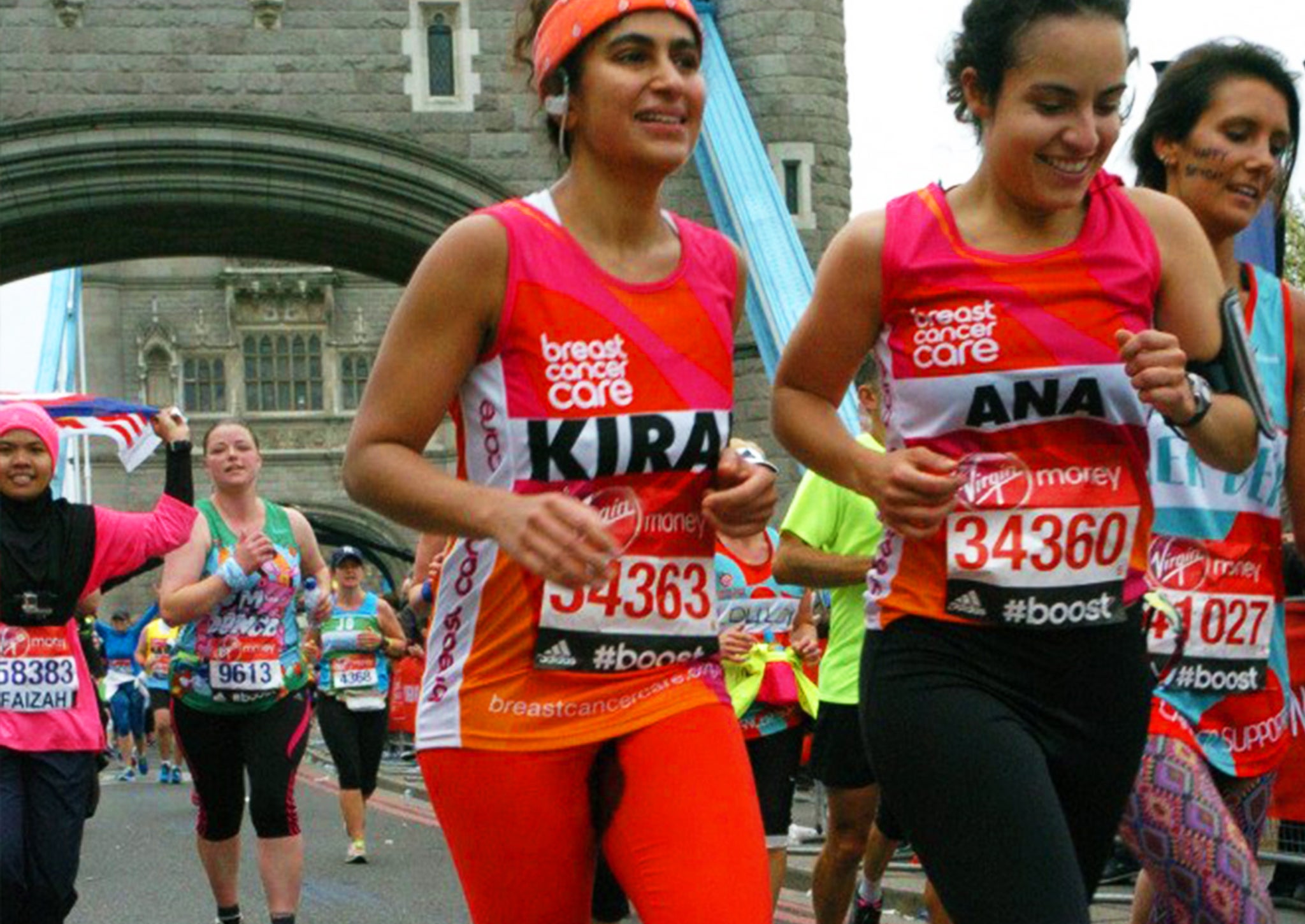
Your support helps us to tell the story
From reproductive rights to climate change to Big Tech, The Independent is on the ground when the story is developing. Whether it's investigating the financials of Elon Musk's pro-Trump PAC or producing our latest documentary, 'The A Word', which shines a light on the American women fighting for reproductive rights, we know how important it is to parse out the facts from the messaging.
At such a critical moment in US history, we need reporters on the ground. Your donation allows us to keep sending journalists to speak to both sides of the story.
The Independent is trusted by Americans across the entire political spectrum. And unlike many other quality news outlets, we choose not to lock Americans out of our reporting and analysis with paywalls. We believe quality journalism should be available to everyone, paid for by those who can afford it.
Your support makes all the difference.The following is the original piece I wrote about my marathon run, which in the past week has gained a lot of attention around the world. For the run, I made a decision about my own comfort that would best enable me to complete the 26.2 miles. And yet, because we don’t talk about this very natural monthly process, my decision shocked many people.
The global discussion that has ensued over the last week revealed how there is actually much more stigma around menstruation than we could have ever imagined. For me, the problem with not being able to speak confidently or comfortably about your own body is that we then can’t make decisions that are best for us. What's more, the path to coming up with better solutions for women is slowed down because no-one wants to talk about it.
In the past century we have only come up with three viable solutions to help women comfortably deal with their periods – a tampon, a pad and a cup. And by not owning the dialogue around our own bodies, others have been able to use it as an insult against us.
Consider how women in developing nations are affected by period secrecy and taboo. Our culture tells them to hide their monthly flow, despite the fact that the ways to clean it up are either unsustainable or unaffordable. Even women who are able to use pieces of cloth to absorb blood don’t always have private places at school or at work to change them out. As a result, they choose skipping school or work as a better, less shameful alternative.
If women continue not to participate in public spheres of life in the developing world, they will continually be put at an economic disadvantage. Secrecy prevents real change by hampering the ability to vocalise innovative solutions.
Periods are here to stay, and our generation has the power to put this conversation on the map today in order to blow through stigma. So let's open up a world of new possibilities for women everywhere.

Yo. Have you ever run a marathon on day one of your period?
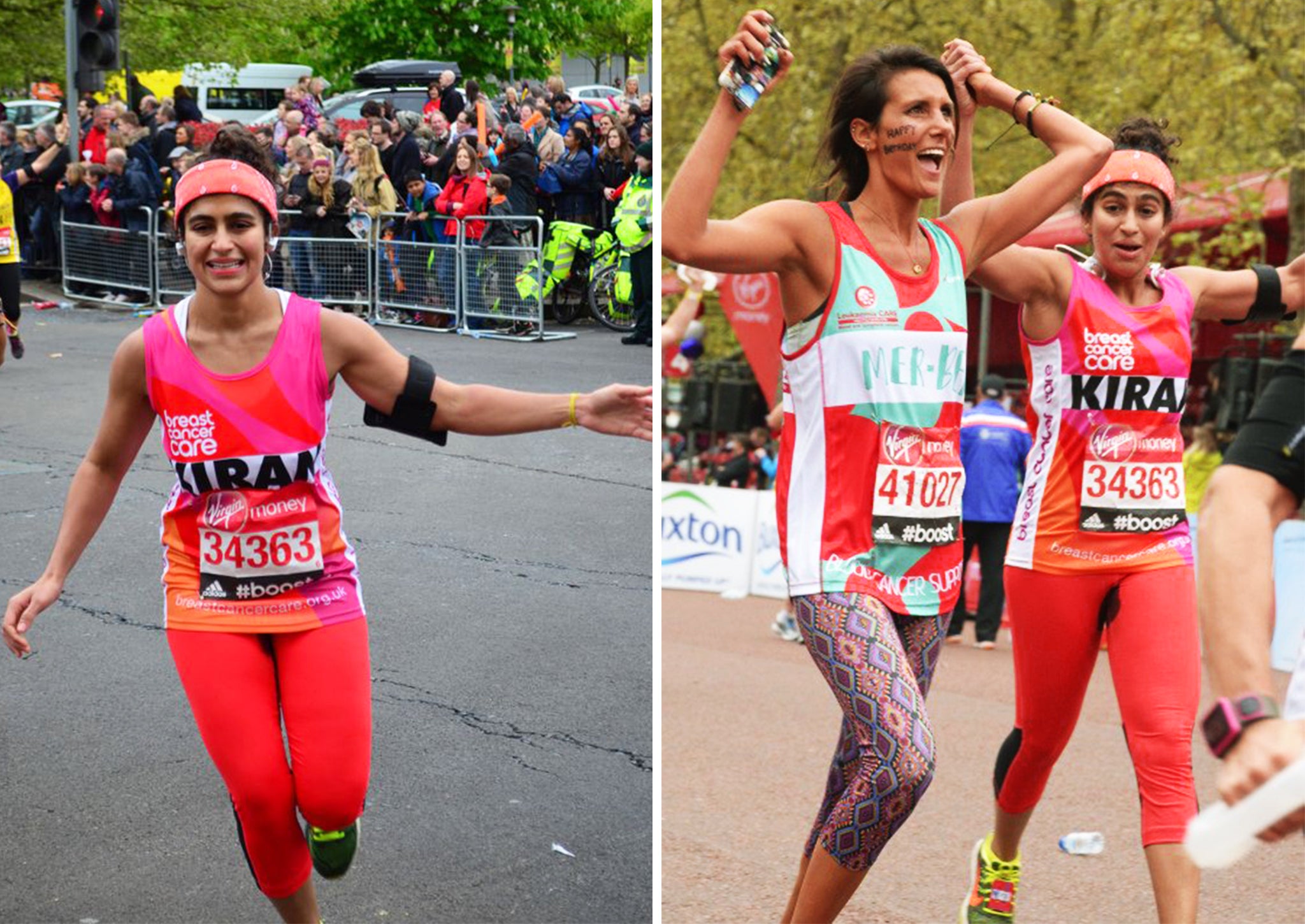
Mile 1
I got my flow the night before the London Marathon and it was extremely painful. It was going to be my first marathon, and I remember already feeling so nervous about it. I had spent a full year training hard, but I had never actually practiced running on my period.
I went through my options. Running 26.2 miles with a wad of cotton material wedged between my legs just seemed so absurd. Plus they say chaffing can be a real problem. I honestly didn’t know what to do. I knew that I was lucky to have access to sanitary products, and to be part of a society that at least treats periods with a degree of normality. I could definitely choose to participate in this norm at the expense of my own comfort and just deal with it quietly.
But then I thought…
If there’s one person society can’t eff with, it’s a marathon runner. You can’t tell a marathoner to clean themselves up, or to prioritise the comfort of others over theirs. On the marathon course, I could choose whether or not I wanted to participate in this status quo of shaming.
I decided to just take some Midol, hope I wouldn’t cramp, bleed freely and just run.
A marathon in itself is a centuries old symbolic act. Why not use it as a means to draw light to my sisters who don’t have access to tampons and, despite cramping and pain, hide it away like it doesn’t exist?
Mile 6
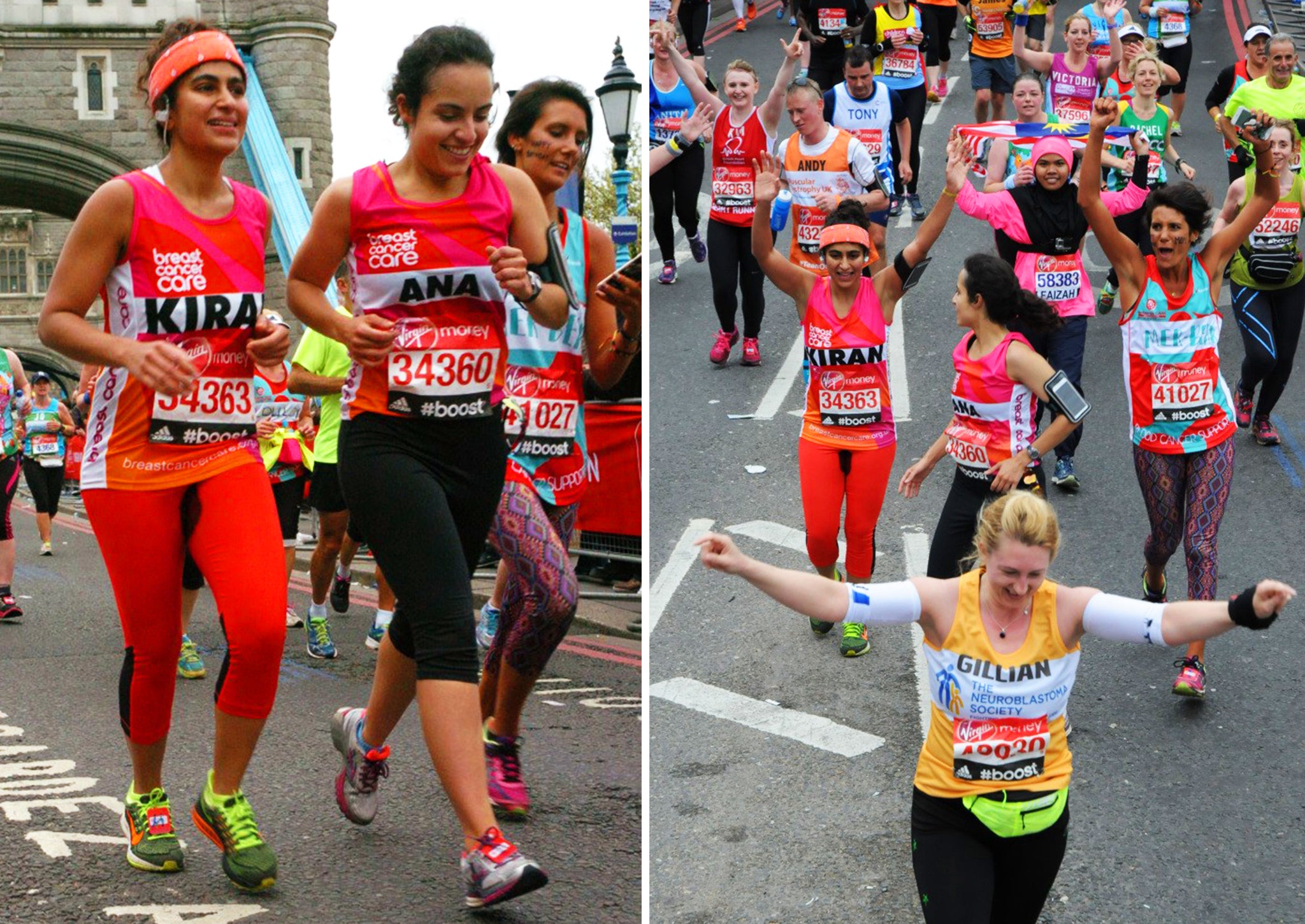
I ran the marathon with two women who are very close to me, Ana and Mere. Both of them had done marathons before. I thought we would split up for sure, but by mile six, they were still with me, right at my side. It was inspiring.
As I ran, I thought to myself about how women and men have been socialised to pretend periods don’t exist. Through period-shaming, society prevents us from bonding over an experience that 50 per cent of the world's population share monthly.
By making it difficult to speak about, we don’t have language to express period pain in the workplace. Such differences between women and men should be accepted, but they're not. Because it's all kept quiet, women are made to think that they shouldn't complain or talk about their own bodily functions, since no-one can see it happening. And if you can’t see it, it’s probably “not a big deal.” Why is this an important issue? Because "this" is happening, right now, everywhere.
And so I started bleeding freely.
Mile 9
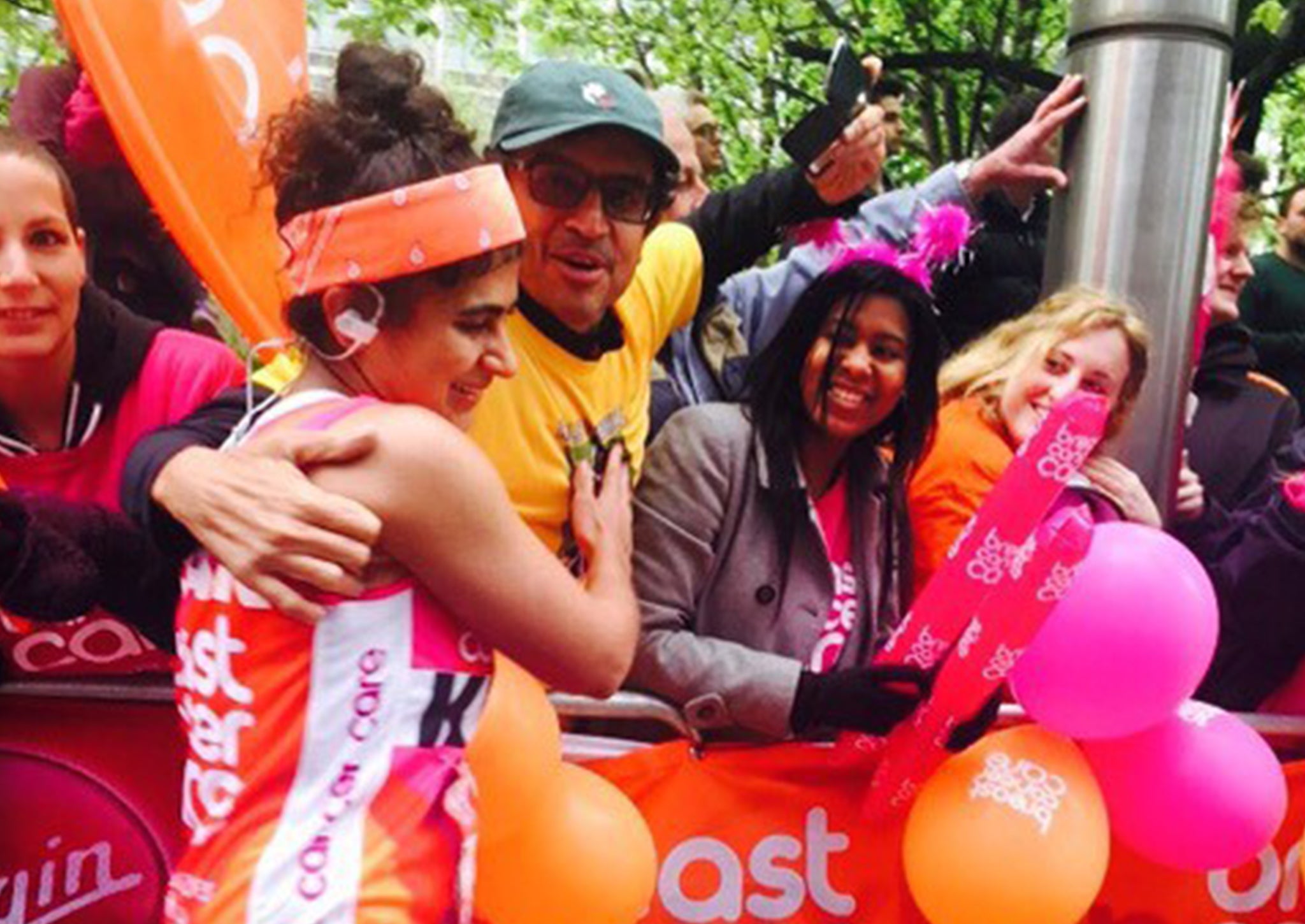
At this point I was going through all these thoughts and analysing whether I was either:
a) A crazy chick who needs to just calm down and reach for an effing tampon(someone came up behind me making a disgusted face to tell me in a subdued voice that I was on my period. I was like… "Wow, I had NO idea!")
b) A liberated boss madame who loved her own body, was running an effing marathon and was not in the mood for being oppressed that day.
And as we come up on mile 9 I saw my dad and brother. They were so completely amazing, smiling and laughing and cheering. I kept trying to awkwardly pull my shirt down to my knees so they wouldn’t see that I was bleeding. But as I approached them, I realized they just wanted to scream and hug and take a photo and celebrate together. They were so in the moment with me and there was so much love. I realised they couldn’t have cared less.
The two most important men in my life were down for team feminism.
Ana’s mom and sister were both there too, screaming and holding up adorable signs all throughout the race — seeing them made us feel uplifted, like part of something really epic. Our families made our decision to go for this crazy marathon feel right.
Mile 13.1
Around us we saw other people exhibit acts of pain and persecution — running barefoot, running while singing karaoke, running with a 40-lbs backpack, and one guy even running as Jesus with a huge wooden cross on his back!
Everyone was running for their own personal mission. And all of a sudden it felt entirely appropriate that I got my period on marathon day.
The sidelines were packed, and maybe it’s delirium and exhaustion, but every single sign I read was hilarious. Even the hydration signs. I was in love with them.
Mile 18.5
They say you hit the wall at 18.5 miles, so I tried to focus my mind on the next milestone. The first was to get to mile six, then to mile nine to see family (my dad and brother made and wore cheer shirts for us!), then the half marathon point at 13.1 over the bridge, then to mile 18.5 to see the breast cancer cheerpoint (we ran for Breast Cancer Care), and then the final stretch to 26.2. I remember thinking, “My body has my back right so hard right now. The female body is incredible. We haven’t even stopped running once. I want us to finish strong.”
Finish Line
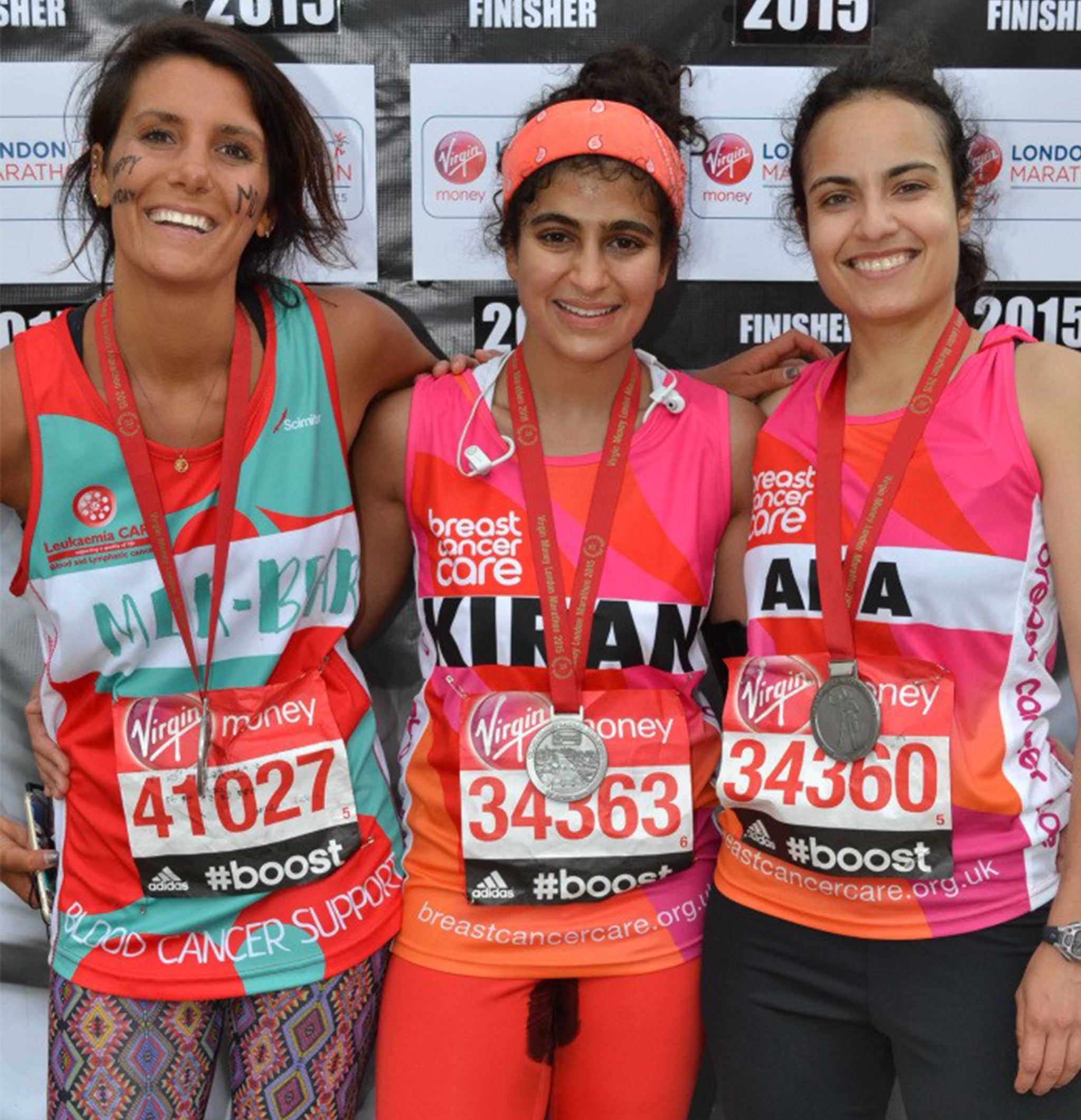
The 2015 London Marathon was everything for me. I trained for a year and then it happened and it really was an epic, epic thing. We ran for women who can’t show their periods in public and for women who can’t compete in athletic events. We ran for our friends who have suffered through period cramps at work and for women who have survived breast cancer.
We ran in sisterhood side by side and we crossed the finish line hand-in-hand.
To this day I analyse a lot of what I do against how I felt during the marathon. I recall the strength to channel positivity, to value working as a team over working individually. I think about goal-setting and executing. I think about pain and fear, and what it feels to overcome those. And I think about feminism, body-positivity, and having the ovaries to practice what you preach.
All photos courtesy of Kiran Gandhi. This post was originally published on The Absurdist.
Kiran ran the London Marathon for Breast Cancer Care. To donate go to: www.justgiving.com/breastcancercare
Join our commenting forum
Join thought-provoking conversations, follow other Independent readers and see their replies
Comments